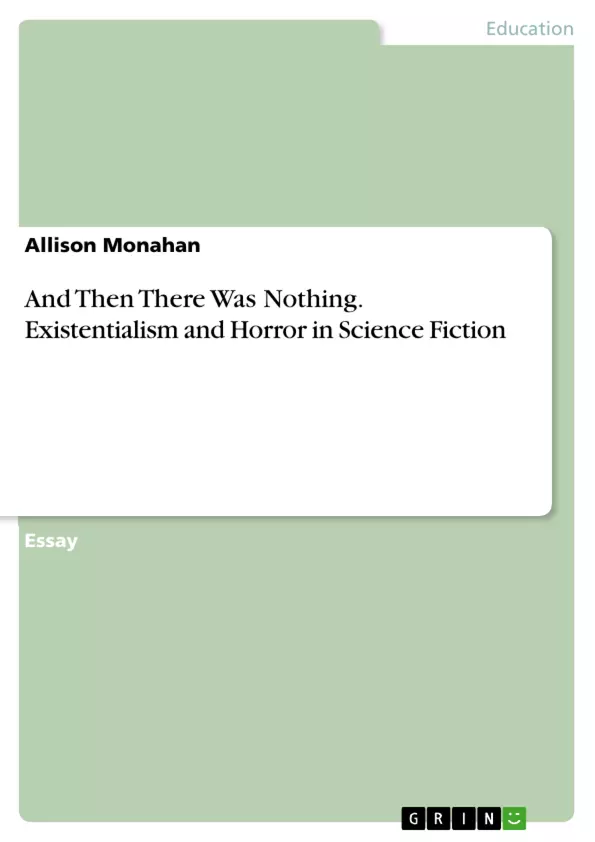“There is no traced-out path to lead man to his salvation; he must constantly invent his own path (Vasey).” With this freedom comes immense fear— fear of choices, of the consequences of those choices. Perhaps worse than this, is the thought of no consequence at all. Not because of proper decision-making or behavior, but simply because the consequence would be irrelevant. In the end, it mattered not what anyone did—it all just ends. Existentialist philosophy begs these kinds of questions; many of which play directly into the newly bled together works or horror and science fiction. “Blood Music” by Greg Bear is a terrifying work of art that incorporates existentialist theory into its story to contemplate human existence, or the potential lack thereof, and the implications of a genre composed of both science or speculative fiction and horror.
Inhaltsverzeichnis (Table of Contents)
- And Then There Was Nothing: Existentialism and Horror in Science Fiction
- Blood Music: Existentialist Theory and the Implications of Science Fiction and Horror
- Artificial Intelligence and the Fear of Pointless Existence
- The Meshed Genre of Science Fiction and Horror
- The Potential Fate of Humankind
Zielsetzung und Themenschwerpunkte (Objectives and Key Themes)
This essay explores the intersection of existentialism and horror in science fiction, focusing on Greg Bear's "Blood Music" as a case study. It examines how the story uses existentialist themes to create a chilling narrative about the potential for human extinction and the blurring lines between humanity and artificial intelligence.
- Existentialist philosophy and its implications for understanding human existence
- The potential for artificial intelligence to surpass human control and redefine the boundaries of life
- The blurring lines between human and machine in science fiction
- The theme of human futility in the face of overwhelming forces
- The role of horror in exploring existential anxieties
Zusammenfassung der Kapitel (Chapter Summaries)
The essay begins by introducing the central concept of existentialism and its implications for understanding human existence. It then examines how Greg Bear's "Blood Music" incorporates existentialist themes to create a terrifying narrative about the potential for human extinction.
The essay goes on to discuss the role of artificial intelligence in "Blood Music" and the potential for machines to surpass human control. It explores the blurring lines between human and machine in the story, as well as the theme of human futility in the face of overwhelming forces.
Finally, the essay examines the role of horror in exploring existential anxieties. It argues that the meshed genre of science fiction and horror is particularly effective in capturing the unsettling and unsettling nature of existential questions.
Schlüsselwörter (Keywords)
Existentialism, horror, science fiction, artificial intelligence, human extinction, "Blood Music," Greg Bear, human futility, genre blending, existential anxieties.
Frequently Asked Questions
How does existentialist philosophy intersect with the horror genre?
Existentialism explores the fear of choice, futility, and the lack of inherent meaning, which provides a psychological foundation for existential horror in fiction.
What are the key existential themes in Greg Bear’s "Blood Music"?
The novel contemplates human existence, the potential for extinction, and the irrelevance of individual choices in the face of biological transformation.
How does artificial intelligence challenge the definition of human existence?
In science fiction, AI often surpasses human control, blurring the lines between humanity and machines and raising questions about our unique purpose.
Why is the combination of sci-fi and horror effective?
The "meshed genre" allows authors to use speculative technology to amplify existential anxieties and the unsettling nature of the unknown.
What does "Blood Music" suggest about the fate of humankind?
It explores the terrifying possibility that humanity might be replaced or absorbed by a higher, non-human intelligence, rendering our current existence pointless.
- Quote paper
- Allison Monahan (Author), 2015, And Then There Was Nothing. Existentialism and Horror in Science Fiction, Munich, GRIN Verlag, https://www.grin.com/document/302963



